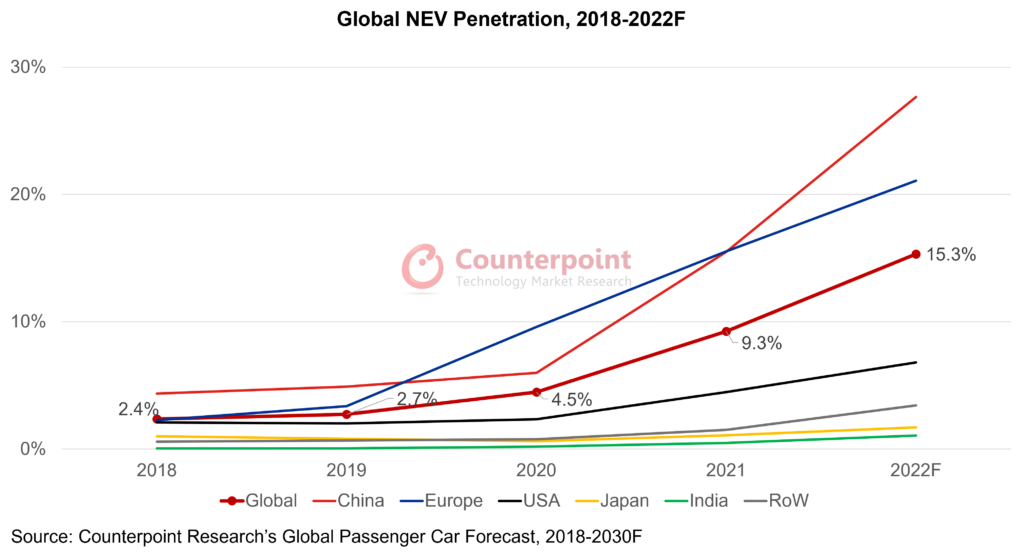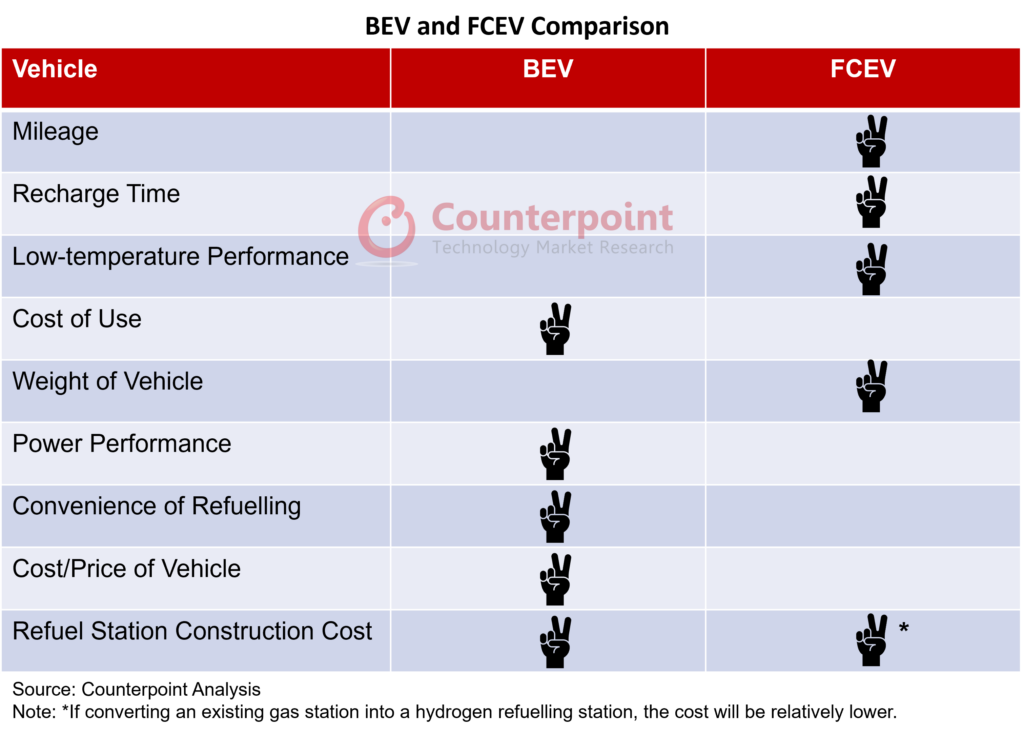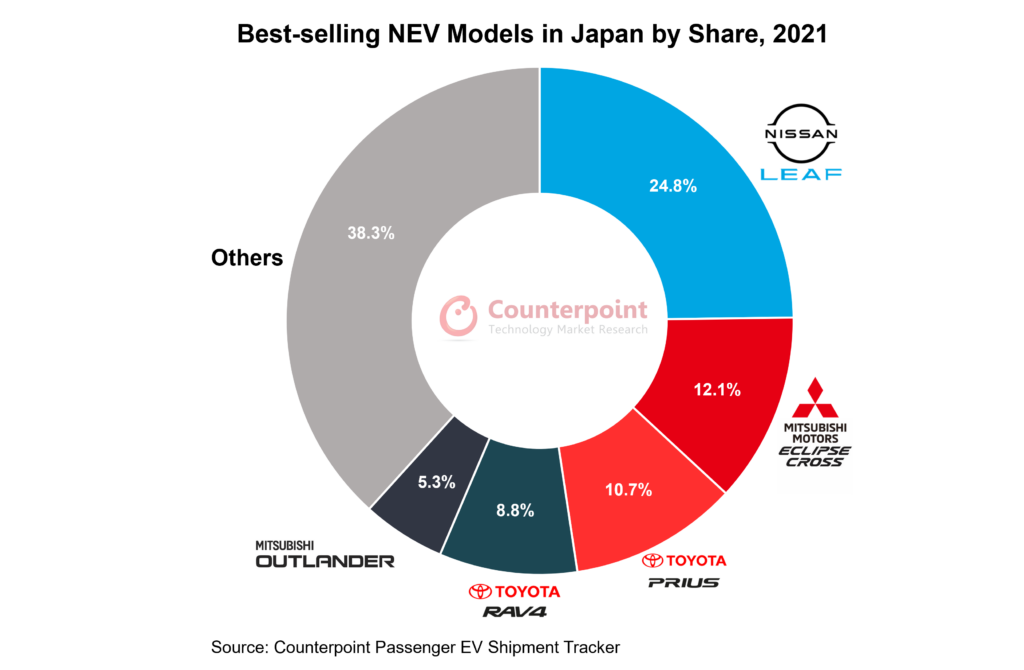For an automotive market like Japan, which is the base of global giants like Toyota, Honda, Nissan and Mazda, and saw early entry of hydrogen-fuel vehicles, it is easy to assume that the country would be a big market for new energy vehicle (NEV) makers. But the numbers tell a different story. According to the latest Counterpoint Research Global Passenger Vehicle Trackers, the NEV penetration in Japan is around 1% compared to around 15% in China.

The total NEV sales in Japan from 2018 to 2021 were just 4% of the total sales in China in 2021. It is easy to conclude that Japan is not an attractive market for EV makers. But opportunities can be found when taking an in-depth look into the market. In fact, the Japanese government is now actively pushing EVs by providing subsidies to set up EV charging stations.
FCEV vs BEV: What will be the future trend?
The debate on fuel cell electric vehicles (FCEVs) and battery electric vehicles (BEVs) has been going on for years now. Many in countries like Japan and South Korea still believe that hydrogen fuel will be the future, while China has been pushing BEVs. Leading NEV maker Tesla has also bet on BEVs and made it to the top of the China NEV market by achieving almost 50% share in H1 2022.

The FCEV has many advantages but the BEV can be scaled up in a shorter time due to a more favorable infrastructure construction cost for the government and enterprises. Moreover, the BEV beats the FCEV both in terms of unit price and cost of use. Given the current macroeconomic headwinds, any plan to set up FCEV infrastructure will find few takers in the government or industry in the near future.
The Nissan Leaf BEV was the best-selling NEV model in Japan in 2021, with more than twice the sales as the second-placed Mitsubishi Eclipse Cross, a plug-in hybrid electric vehicle (PHEV).

Why BYD decided to enter Japan electric car market?
China’s BYD recently launched three electric car models in Japan – Seal, Atto 3 and Dolphin. As discussed above, Japan’s NEV market is comparatively small. So, what are the factors driving BYD’s Japan electric car market entry? We discuss them below:
- Not a newbie in Japan’s vehicle market: BYD is already selling its electric buses in Japan. Furthermore, through tie-ups with Japanese companies including Toyota, Kansai Electric Power Company and Keihan Bus Company, BYD has a better understanding of the country’s consumption patterns.
- Cost competitiveness: Within the same price segment, BYD can offer better vehicles in terms of mileage and other performance parameters.
- Investment in charging infrastructure: Either by itself or together with the government, BYD has to increase the number of charging stations and charging points. The difference between China and Japan here is that there is a higher proportion of private charging points in China. But in Japan, more public charging points are needed due to the higher cost of land and parking slots. That is why the Japanese government is providing subsidies to set up EV charging stations.
- Localization: The Japanese market has a unique taste in consumer electronics, such as the consumers here prefer to buy the iPhone SE while their counterparts elsewhere are likely to favor bigger-screen smartphones. The same is true for vehicles. The Kei car category, created by the Japanese government for the smallest permissible cars, is popular among local car users. Of the three models launched by BYD, the Dolphin is very similar to a Kei car. The key reasons why Kei cars are welcome in Japan include:
- Streets are narrow in Japan, especially in major cities.
- There are many mountain roads in Japan.
- Parking space is scarce.
China EV makers going overseas: Challenges and opportunities
Unlike the traditional internal combustion engine (ICE) vehicle era, China’s vehicle makers are big players in the NEV arena. Core NEV technologies like battery, motor and electronic control systems are all now being developed in China also. It is undeniable that China’s NEVs now dominate the market volumes globally. China’s NEV companies and even traditional car companies consider it strategically important to enter overseas markets.
Besides China, Europe and US are the other major markets with good EV penetration and growth. The rest of the markets are still in an educational phase. Therefore, some caution is needed for the NEV makers planning to enter markets like Japan.
The acceptance of the NEV: Although the safety levels of BEVs, PHEVs and FCEVs have improved and reached that of ICEVs, it still needs time for a large number of consumers to trust NEVs, especially in the markets dominated by ICEV manufacturers. But the situation is gradually improving with more and more friends, relatives or other known people using NEVs.
Cost: Many times it is the cost that triggers a purchase or replacement decision. For Chinese NEV makers, cost control is important as still many key parts are made only by a few players.
Better products: Besides the core technologies for the car’s hardware, new applications such as smart cockpit, driving assistant and driverless option are being introduced on the software side to improve the car user experience. Vehicle makers must continue to focus on removing key pain points of target consumers.
Brand power and market competitiveness: Car consumers are more willing to pay a premium for a known brand name. At the same time, many are looking for more bang for their buck. Therefore, it is important for car makers to study consumer behavior and composition of the market they are planning to enter.
Investment and policies: The NEV ecosystem in many markets is still not mature. Huge investments are required to develop this ecosystem, whether it is manufacturing units, service centers, points of sales or charging stations. With the goal of “zero carbon” in mind, many countries provide incentives to NEV makers and consumers, though the risk of policy change always remains.

